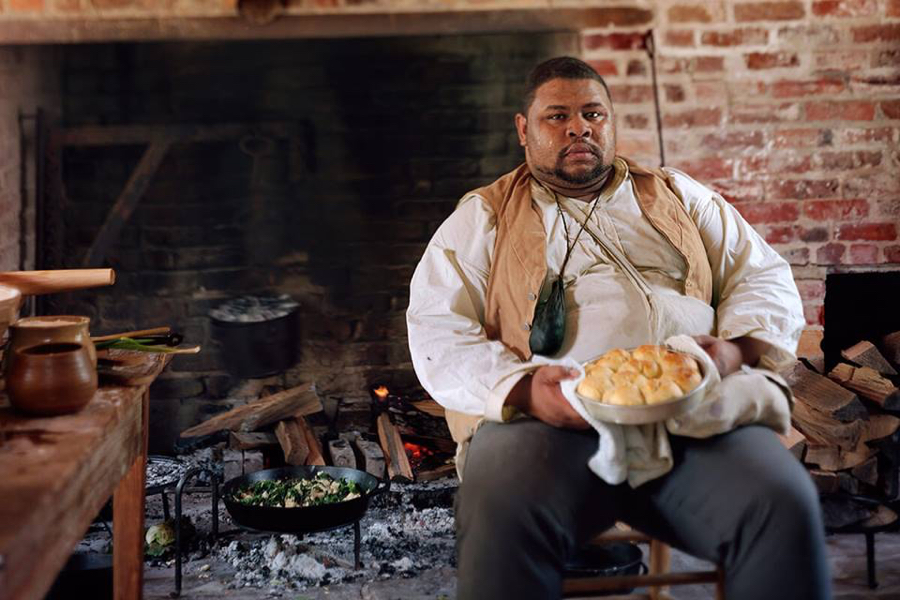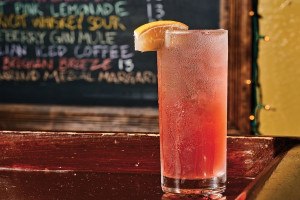The Black Food Historian Who Called Out Paula Deen Will Talk Culinary History in Philly
In his book The Cooking Gene, chef, gardener, historical interpreter, and author Michael Twitty traces Southern food's true roots — and his own — to the earliest African-Americans and beyond.

The Cooking Gene | Facebook
Michael Twitty, the self-taught chef, gardener, scholar, historical interpreter, blogger and author, has been drawing attention to the real roots of Southern cuisine and classic American dishes through his Cooking Gene project since 2011 — and making headlines in the food world by calling in southern celebrity chefs like Paula Deen and Sean Brock for cultural appropriation along the way.
And his book, The Cooking Gene, should be our next Omnivore’s Dilemma — a must-read for everyone, but especially for those interested in food culture. It’s a deeply personal work that confronts what we think we know about food, history, and culture and shapes the national conversation about what goes onto our plates and where — and who — it came from.
I had the chance to speak with Michael Twitty last week in advance of his upcoming appearances and classes at Drexel and the Free Library’s Culinary Literacy Center — his first engagements in the Philly area. What I thought would be a brief chat about the book, his work, and his Philly visit stretched into an hour-long conversation about heirloom vegetables, systemic racism, #metoo, cultural appropriation, and the perils of patronizing the farmers’ market while Black.
This interview has been condensed and edited.
On folks who are “just here for the food”:
One of the biggest disjoints across the country has been this idea of food for food’s sake and food for social justice’s sake. A lot of people don’t want to have to worry about power and privilege. They straight up go, “Oh, I’m just here for the food. I’m not here for that race stuff. That’s not important to me.” That’s the pushback I’ve received about The Cooking Gene. A minority of people, but some people, wrote reviews or emails or made comments — “I guess you have to be Black.” And that doesn’t just hurt, it shows a nearsightedness.
[Some people] read it and thought, this’ll give me some good old Southern secrets. No — I’m gonna tell you the truth. I think that there are some people who just don’t seem to understand that you can’t run away from the baggage. They say that food is just the easy way to run away from the baggage. No, it’s not — actually, it’ll put you right back on to the baggage wheel. “I guess you have to be Black.” No, not really. In fact, I hope that people who don’t look like me would gain something from learning about somebody who’s different. That’s what we all really want — people to have a common understanding and to meet each other halfway. That’s what it’s about.
On parallels between sexual harassment and racism in the food world:
It’s about power, and it’s about the fact that we have an unchanged attitude that women somehow need to kowtow to men and need to be grateful to be in a professional kitchen…Men and women are in the kitchen every damn day, doing it, killing it — despite the fact that they’re being harassed and treated badly and hear racist speech and misogynistic speech and homophobic speech.
On how food media should cover chefs of color:
The food media has to ask new questions. It should not be, “Where are all the black chefs?” You get that every six months. That’s not the question to ask. The question is, what are the black chefs doing? Who are they, why do we need to look at them, what can they teach all of us? We need to ask the food media not to pigeonhole black chefs. Black chefs can do any cuisine — anything they want. But I think that a lot of food media wants to be trendy and hot and interesting…or [treats the issue as if] they’re slumming it on a culinary level.
I’ve seen a lot of articles where people talk about using junk food or using upscale soul food by throwing a bottle of champagne at it, or talking about moscato or Hennessy or whatever — those things that rappers talk about just to be cool. That’s not what being a Black chef is really about. The kind of work that I’ve been doing is about heritage and tradition. The reality is, a lot of Black chefs want to know about heritage and tradition. They want to know about where their people come from, how they can incorporate that as they grow in their career, and how they can pay homage to that. I started something, I’m proud of that.
On his Philly connections and how the Great Migration changed how African-Americans ate:
I have a few cousins [in Philly]…that side of the family definitely was from Virginia to Philadelphia. A lot of people came from central and southern Virginia to Philadelphia, not only during slavery time as freedom seekers but also, especially, during the Great Migration.
[I would] take the train to see my grandmother, and they pretty much stuck to the script [in terms of food]. It was very simple Virginia, African American-style southern fare. The biggest difference was they didn’t raise the food themselves. They had to buy the ingredients — there was a big difference. I didn’t realize it at the time, but you just couldn’t swap out one thing for the other. It wasn’t the same. All this talk I’d always heard — “The food doesn’t taste the same” — it wasn’t the same. I thought it was just an issue of nostalgia. I didn’t realize that it’s not nostalgia. It was actually them talking facts.
They were saying, we don’t have the same varieties. They didn’t have access to fresh food — as fresh is it would be when we’d raise it ourselves in season [at home in Maryland]. When you’re little, you don’t understand. But all the stuff I talk about now is is very pertinent to those conversations then. We didn’t have the language. No one thought in terms of heirlooms, right? But that’s what they meant.
On why he doesn’t shop at farmers’ markets:
I dropped out of the whole rest of the farmers’ market local movement, because I got so tired of being treated in condescending ways — spoken to as if I didn’t know anything. And there really doesn’t seem to be any interest in transferring or shifting some of the power from that kind of scene to the community.
I write recipes that say ‘grow this’ because I want the person to actually grow the food and cook it. That’s a big deal. I really want people to return to the land. Living in Philadelphia, it might be a little bit difficult. But community garden efforts, or growing little plots in the yard, borrowing with each other, is a big start. Purchasing land, acquiring land to grow food — as [urban farming luminary] Ron Finley says, growing food is growing money.
On owning the trauma and telling the story of African-American history:
If you are a member of a group and the trauma is yours, then so is the responsibility to tell the story the way that you want it to be told. And that starts with your children. You can’t run away from them — sorry, nope.
Guess what? The school system is not going to be thorough in teaching about something that is not glorifying and reifying America. So it’s a job of the parents of African descent to teach their children about their own history, to send them into school and ready. No other community asks the school to do their work for them, so we shouldn’t either.
On explaining his role — and his clothes — as an historical interpreter of African-American foodways:
It really surprised me. I didn’t realize how deep the issues with other Black folks would be regarding just the surface stuff. To me, those clothes are just the surface. There’s really nothing deep about it. You go to Monticello or some other historic site, you’re gonna see historic interpreters, and they’re gonna wear those clothes. What’s the difference? For a lot of people, just wearing the 19th-century clothing is slave clothing, when in reality, you and I both know that I wasn’t really going to dress like somebody who worked in a field in Mississippi in 1850. The clothes that I wear in that picture are wonderful compared to what I could be wearing.
Furthermore, they don’t get that if we’re not there, our story isn’t told. People push back — from the get-go, I got called a slave. “Why you wanna be a slave?” And I’m like, you don’t even understand what that means! Get outta here. Some woman says, “Why is he picking cotton?” These few people who’ve never actually done anything in the ground in their life, who don’t have any sort of context for any of it. […]
I wish I could tell you everybody Black was behind me and what I did, and they’re not, because I made the choice to put myself out there, and I did two things that some people of color don’t like. Number one, I wear period clothing on the job and take a lot of pictures of me doing that. There are people who think that I wear that all the time. Please. It’s really not comfortable…I put clothes on to do a job then take them right off.
But the other half of it is that I’ve also made some Black folks in the food world very nervous by talking to and challenging people like Paula [Deen], or talking to Sean Brock about accepting this mantle without looking at the repercussions of it.
On Sean Brock and cultural appropriation:
[Sean] quietly accepted this crown without really looking at the implications of what it was doing for other people. When some editor asks me, what did I know that Sean Brock didn’t already know? I told [Brock], “Man, when you hear that, that’s when you gotta do something. You gotta stand up.” I think he sort of understands that. From his perspective, he’s like, “Well, I don’t really have much to do with it, that’s not me.” But then I was like, “Well, you haven’t exactly told them they were wrong yet, have you?” And that’s the problem. It’s not that you said, “I’m gonna go appropriate something.” They’re doing that for you. My thing with him was, you seem like, one on one, a decent person. But in the media, your PR people are letting you go right along with it.
If I was him, I would say, I’m not the first person to do this. I respect this culture. I’m happy to incorporate elements of it in my restaurant but if you really want to see the source go to…” Because that’s all it takes.[…]
People are very naive. One guy wrote me on Twitter, saying “Y’all should just go and get you a loan and get you a business and compete and show that you’re the best.” You don’t understand how structural racism works, do you?
Racism isn’t calling someone a nigger. Racism is treating them like one. There’s a difference. I think a lot of people, unfortunately, really think it’s just an issue of feelings and not facts. No, it’s definitely facts, it’s definitely programs and protocols…I hope Rick [Bayless] has that conversation, especially with the Mexican and Mexican-American food community, to say “Yes, I have this privilege, and this is what I’ve done, and I hope that you understand that I really do respect you” — but that’s not where it is. It’s “You’re mad because I’m white and successful.”
On connecting with his west African roots for the first time:
I’ve got two Yoruba living cousins, I’m part Yoruba. This is my story too…I went to Howard to learn Yoruba. Do you know what it feels like to know that you unwittingly committed yourself to learning the language, the lost language, of your ancestors and you didn’t even know it? Who is in control here? Is it me or the ancestors?
Same thing with the food. When you go there and you see all this okra and black-eyed peas and red peppers and tomatoes and onions and ginger, garlic and spices like you’ve never seen spices before, and fresh fruit and frying fish, rice all over the place…it’s amazing to be in a world where this sort of proto-soul food, the origins of it, the heritage of it, is not just somewhat there — you’re in the thick of it. And it’s only you —it’s not everybody else’s stuff. It’s not walking past the organic aisle to get to the soul food aisle. Everything is organic and everything is soul.
Get tickets to Michael Twitty’s Philly Chef Conference-sponsored book talk at Drexel University on February 26th here (a copy of The Cooking Gene is included), register for the Free Library’s Southern Foodways Panel with chef Valerie Erwin and scholar Dr. Jessica Harris on March 5th here, and get tickets to his March 6th cooking class featuring Country Captain, a chicken dish that draws inspiration from South Asian curries and the cuisines of southern plantation kitchens, here.


